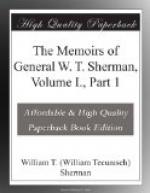expenditures he was extremely economical, but not penurious.
In cases where the officers had to contribute money
for parties and entertainments, he always gave a double
share, because of his allowance of double rations.
During our frequent journeys, I was always caterer,
and paid all the bills. In settling with him
he required a written statement of the items of account,
but never disputed one of them. During our time,
California was, as now, full of a bold, enterprising,
and speculative set of men, who were engaged in every
sort of game to make money. I know that Colonel-Mason
was beset by them to use his position to make a fortune
for himself and his friends; but he never bought land
or town-lots, because, he said, it was his place to
hold the public estate for the Government as free
and unencumbered by claims as possible; and when I
wanted him to stop the public-land sales in San Francisco,
San Jose, etc., he would not; for, although he
did not believe the titles given by the alcaldes worth
a cent, yet they aided to settle the towns and public
lands, and he thought, on the whole, the Government
would be benefited thereby. The same thing occurred
as to the gold-mines. He never took a title to
a town lot, unless it was one, of no real value, from
Alcalde Colton, in Monterey, of which I have never
heard since. He did take a share in the store
which Warner, Beator, and I, opened at Coloma, paid
his share of the capital, five hundred dollars, and
received his share of the profits, fifteen hundred
dollars. I think also he took a share in a venture
to China with Larkin and others; but, on leaving California,
he was glad to sell out without profit or loss.
In the stern discharge of his duty he made some bitter
enemies, among them Henry M. Naglee, who, in the newspapers
of the day, endeavored to damage his fair name.
But, knowing him intimately, I am certain that he
is entitled to all praise for having so controlled
the affairs of the country that, when his successor
arrived, all things were so disposed that a civil
form of government was an easy matter of adjustment.
Colonel Mason was relieved by General Riley some
time in April, and left California in the steamer of
the 1st May for Washington and St. Louis, where he
died of cholera in the summer of 1850, and his body
is buried in Bellefontaine Cemetery. His widow
afterward married Major (since General) Don Carlos
Buell, and is now living in Kentucky.
In overhauling the hold of the steamer California, as she lay at anchor in Monterey Bay, a considerable amount of coal was found under some heavy duplicate machinery. With this, and such wood as had been gathered, she was able to renew her voyage. The usual signal was made, and we all went on board. About the 1st of March we entered the Heads, and anchored off San Francisco, near the United States line-of-battle-ship Ohio, Commodore T. Catesby Jones. As was the universal custom of the day, the crew of the California deserted her; and she lay for months




